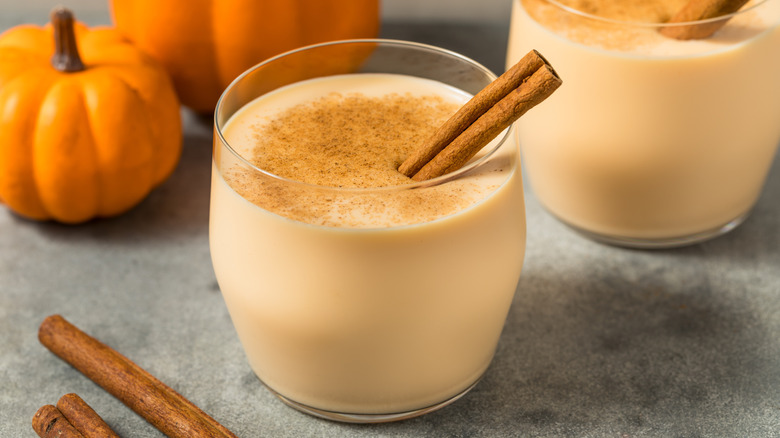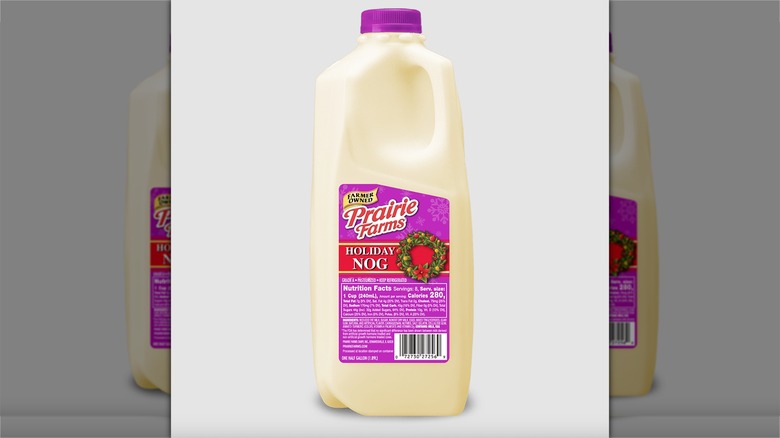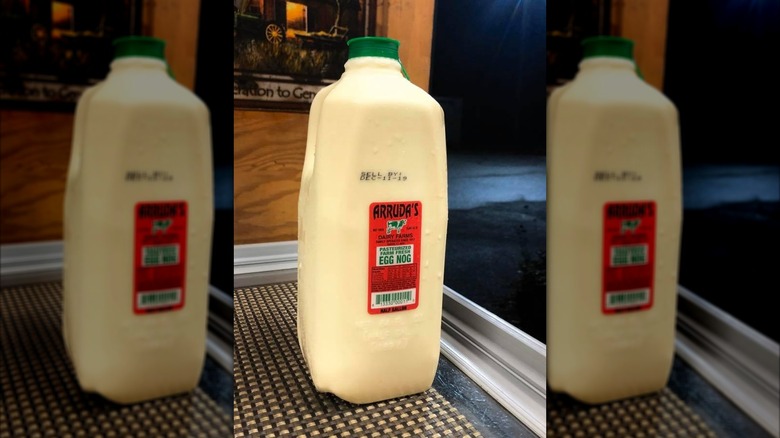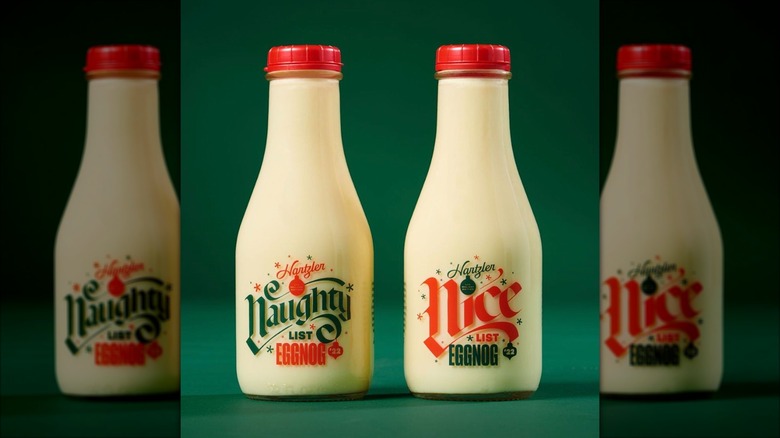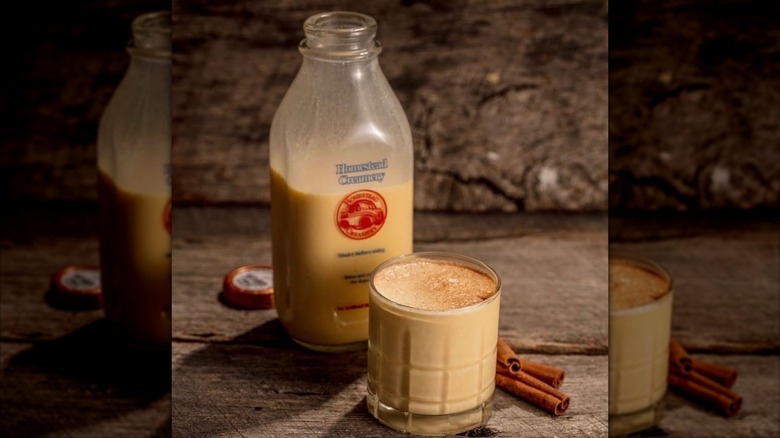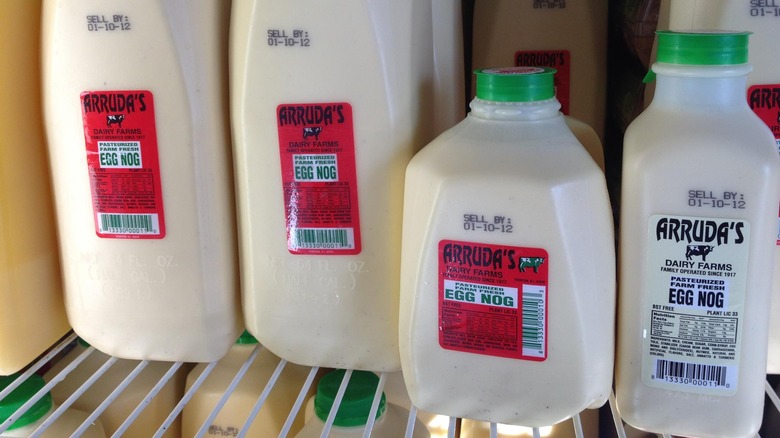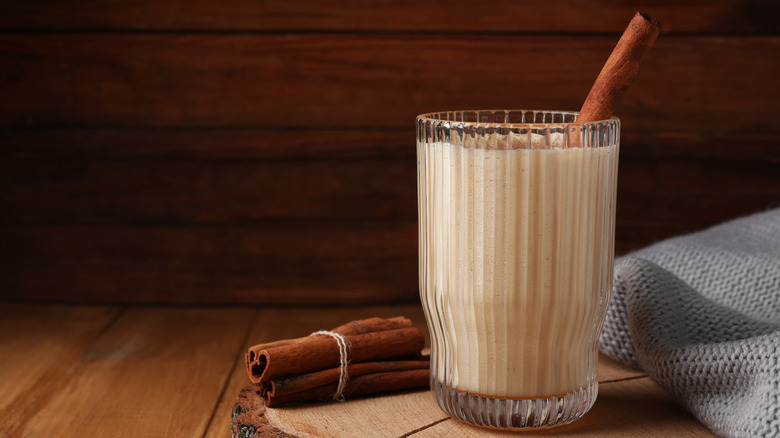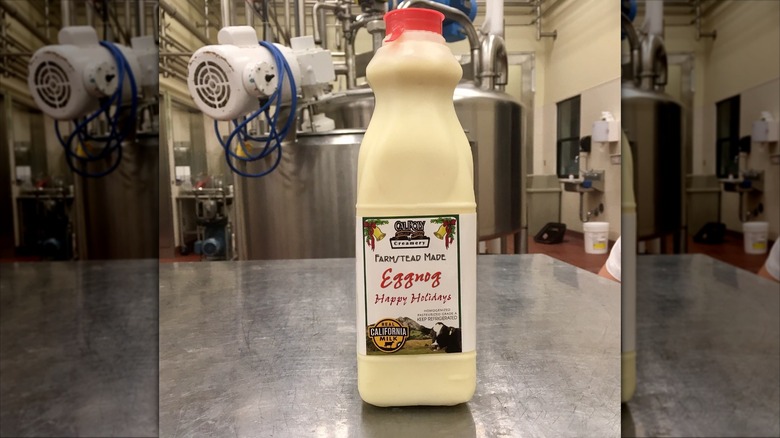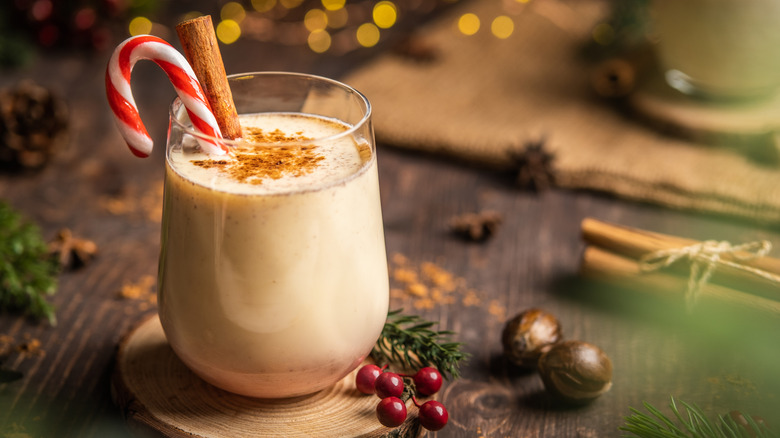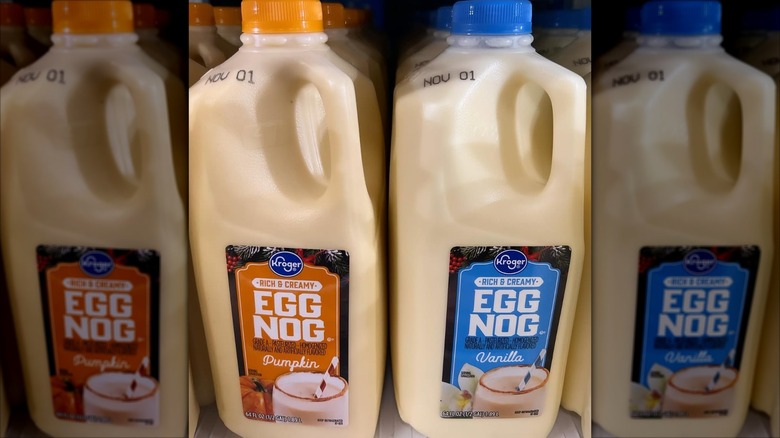Eggnog Recalls That Affected Millions
'Tis the season to sip one of the greatest culinary creations of the holidays: eggnog. It may not be to everyone's taste, but to those who like its creamy goodness, eggnog's unbeatable combo of egg yolks, sugar, milk, cream, vanilla, and nutmeg is one of the highlights of the festive period. Overindulgence is obviously the biggest risk here (and one we're willing to take), but consuming a drink made with raw eggs also presents a much more dangerous possibility: food poisoning.
Despite the name, a lot of people forget that eggnog actually contains, well, eggs. That means its potential for salmonella — a kind of bacteria known to trigger diarrhea, vomiting, and abdominal pain — often slips the mind when the holidays roll around. While the versions of eggnog you purchase in-store are pasteurized, which slashes those odds considerably, that isn't always the case for eggnog whipped up at home. The holidays are dotted with localized salmonella outbreaks from homemade eggnog, with one of the most infamous occurring at a nursing home Christmas party in New Jersey in the 1980s, sickening nearly 80 people and sadly killing five.
But even store-bought eggnog isn't entirely risk-free. Like any food product, manufactured eggnog has sparked multiple recalls over the years. Most are linked to its pasteurization, which if left incomplete, increases the odds of unfriendly bacteria ending up in your drink. From salmonella to sanitizer, here are some of the biggest eggnog recalls to blight the holiday season.
Batches of Prairie Farms Holiday Nog forgot to declare the egg
Prairie Farms is a farmer-owned cooperative that specializes in all things dairy. While milk, iced coffee, and ice cream make up the bulk of its year-round business, the holidays are marked by the sale of Holiday Nog — its spin on the classic drink, sold in stores such as United Dairy Farmers. In 2023, however, the dairy was forced to pull its Holiday Nog from retail locations amid panic over allergen labels.
While it may not explicitly mention it in the name, Holiday Nog — like all eggnog — contains eggs. The issue was that Prairie Farms hadn't explicitly labeled eggs in its allergens list, meaning people with an egg sensitivity who purchased a bottle were potentially at risk. Anyone who had picked up Holiday Nog at United Dairy Farmers stores between December 4 and December 6, 2023, was asked to return their bottle ASAP for a full refund. Luckily, no illnesses were reported in relation to the labeling mishap, but it's always better to be safe than sorry when it comes to allergens.
Arruda's Dairy Farm Egg Nog wasn't fully pasteurized
Salmonella is far rarer in eggs today than it was back in the 1980s and 1990s, but you can never totally rule out the possibility of lingering bacteria. That's why pasteurization is critical when it comes to producing the safest, risk-free eggnog possible. Blasting them with a high temperature kills any pathogens potentially lurking in your eggs. If this process is incomplete, you can't say for sure that the raw egg is safe to consume.
That's exactly what happened with Arruda's Dairy Farm Egg Nog in November 2023. During a routine inspection, the company realized that two batches of its eggnog had been improperly pasteurized, triggering a voluntary recall for any products sold in Rhode Island and Massachusetts with a best-by date of November 25 and December 9. It also pulled any affected bottles from stores and vowed to replace any returned eggnog with a fresh (and fully pasteurized) batch. Once again, while nobody actually fell ill from consuming any unpasteurized Arruda's Dairy Farm Egg Nog, you can never be too careful when it comes to avoiding foodborne illnesses. We'd rather ditch our freshly purchased eggnog than take our chances with salmonella over the holidays.
Some bottles of Hartzler Eggnog contained undeclared allergens
Undeclared allergens were an issue for Hartzler Eggnog in December 2022. Hartzler Family Dairy — a family-run dairy farm in Ohio — sells the holiday classic every year, accompanied by a new festive design for its glass bottle. Back in 2022, the bottles featured a "naughty or nice" illustration but failed to include the full list of ingredients on every product, which is a major no-no in the food industry.
Upon realizing its mistake, Hartzler issued a recall for any quart-sized bottles with a sell-by date of December 15 or December 25. While the Ohio Department of Agriculture urged anyone displaying signs of an allergic reaction to seek medical attention, no cases were linked to the festive treat. As news of the recall spread and customers began to panic about the potential risks of their eggnog, Hartzler also took to Instagram to share a video stressing that it was "100% safe to consume," but some bottles had just managed to hit stores without their allergen stickers.
Some Homestead Creamery All Natural Eggnog came with an unexpected side of not-so-natural sanitizer
When Homestead Creamery recalled its All Natural Eggnog in November 2020, the issue didn't lie with the eggnog itself. While every bottle contained a perfectly safe (and delicious) drink, the same couldn't be said of the bottle. The company recalled 21 products — including lemonade, milk, custard, and three sizes and varieties of eggnog — in both its returnable and non-returnable glass bottles, over fears that they were contaminated with chlorine.
The chlorine didn't just fall into the bottles by mistake. Instead, it's thought that the sanitization process had gone wrong at some point, leaving a lingering taste and smell of chlorine in each beverage. While nobody fell ill due to the error, there had been complaints that the drink had an odor akin to a cleaning product. Rather than put a chlorine-scented dampener on the holiday season, eggnog with a best-by date of November 15 was pulled from The Fresh Market stores in 22 states.
Bottles of Arruda's Dairy Farms Egg Nog tested positive for salmonella
Salmonella is one of the most dreaded words in the food industry, and for good reason. With symptoms such as vomiting, abdominal pain, and diarrhea, salmonella infections (known as "salmonellosis") cause an estimated 26,500 hospitalizations and 420 deaths every year in the U.S. alone. As we've learned more about the bacteria over the decades, companies have introduced more steps to try and prevent contamination — including routine sampling, which may have halted a potential salmonella outbreak from Arruda's Dairy Farms in December 2017.
Eggnog produced at its dairy in Tiverton, Rhode Island, was pulled from the market after said sampling raised red flags for salmonella. Arruda's Dairy Farms temporarily paused eggnog production to identify the source of the problem alongside the Rhode Island Department of Health. Plastic bottles of the eggnog in question had already been distributed via home delivery and sold at retail stores in Rhode Island and Massachusetts. Customers were urged to return them to their point of purchase, with the main concern being that many would still have unused eggnog in their kitchens due to the fact that the sell-by date stretched two months into 2018. Fortunately, with no reported illnesses, this turned out to be a best-case scenario kind of salmonella recall.
Coulter Farms Eggnog was deemed dangerous over incomplete pasteurization
Coulter Farms is a family-run business that operates out of Honey Grove, Pennsylvania. Its products — eggnog included — are available to order online but are also frequently sold at farmers markets throughout the local area. It was at the Old Town Farmers' Market in Alexandria, Virginia, that customers purchased improperly pasteurized eggnog in December 2016, sparking an urgent warning from the Alexandria Health Department.
As per the city's notice, the alarm was raised by a health inspector conducting a routine inspection. Failing to fully complete pasteurization doesn't necessarily mean eggnog will definitely be contaminated with bacteria. In fact, the Centers for Disease Control estimates that just one in every 20,000 eggs on the market is contaminated with salmonella, and some people actually make a habit out of drinking raw eggs to help build muscle. However, neglecting to carry out pasteurization poses a slight risk should that one egg fall into the batch used for your eggnog — and does any manufacturer really want to take that risk?
As a precaution, all eggnog purchased from Coulter Farms at the Alexandria market on December 3, 10, and 17 was recalled. Realistically, most of this eggnog would probably have been consumed by the time the recall was issued, but customers were still encouraged to throw out any remaining beverages, just in case.
928 bottles of Cal Poly Creamery Farmstead Made Eggnog were pulled over E. coli fears
Considering the sheer number of food recalls that happen every year, some can feel a bit like an overreaction, especially when zero people have fallen ill. But that's the entire point — speedy, preemptive recalls ensure that this number stays as close to zero as possible. A good example is California Polytechnic State University, which, in December 2011, was quick to recall a batch of Farmstead Made Eggnog to prevent positive tests for E. coli bacteria from escalating into a full-blown food safety scandal.
The eggnog in question was produced at the college's Cal Poly Creamery, which operates as both a dairy facility and a teaching facility. In total, 928 bottles were pulled from four retailers: Scolari's Foods, Spencer's Fresh Markets, SLO Fresh Market, and the Cal Poly Campus Store and Village Market. No illnesses were reported, but Cal Poly Creamery still pressed pause on its eggnog production so it could conduct a joint investigation with the California Department of Food and Agriculture into how E. coli contaminated its products in the first place. Now that's a first-class lesson for students on how to respond to a food contamination crisis.
Improper pasteurization sparked a recall of Golden Glen Creamery Eggnog
Pasteurization (or rather, the lack of it) again proved to be an issue in November 2006. Eggnog produced by Golden Glen Creamery — a small dairy farm located in Bow, Washington — was recalled due to the possibility of lingering pathogens after incomplete pasteurization of the drink.
Making this recall slightly easier was the fact that the product had only been distributed relatively locally. Quart-sized bottles of the eggnog with a best-by date of November 28 were pulled from 10 cities across Washington, including Seattle, Everett, and Bellingham, with anyone who had not yet drunk their purchases encouraged to return them for either a replacement or a refund. No illnesses were linked to the eggnog, and at least it happened early enough in the festive period to give any eggnog aficionados time to refresh their supply for the holidays after being forced to ditch their bottles.
Kroger and Sealtest Eggnog were victims of processing problems
Crossroad Farms Dairy may sound like the name of a wholesome local dairy farm, but it's actually a manufacturing plant owned by grocery store giant Kroger, and the largest of its kind in the world when it opened in 1973. The long list of food items produced at the plant includes eggnog, which sparked a mass recall in December 2001 after Crossroad Farms Dairy realized some batches hadn't been processed properly.
The recall included half-gallon containers of both Kroger Eggnog and Kroger Lowfat Eggnog, as well as a Sealtest eggnog also sold at Kroger. All of the products involved had specific sell-by dates in December and had been distributed to Kroger stores in Ohio, Michigan, Indiana, Illinois, and Missouri. As is often the case, nobody reported any illnesses after drinking the eggnog. However, as per the Egg Products Inspection Act (EPIA), all egg products need to meet strict pasteurization requirements to qualify for retail sale, meaning a recall is always necessary regardless.
